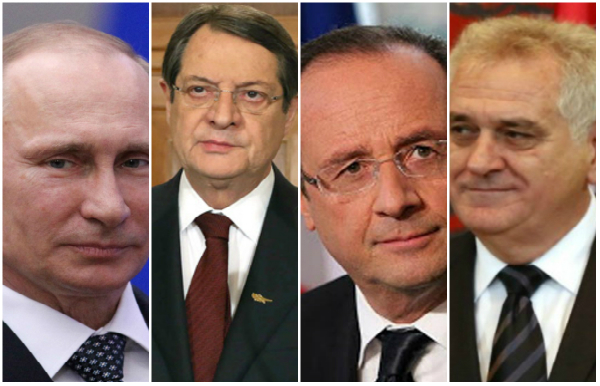
Verifying and confirming the names of high-ranking guests, state delegations, and famous people arriving in Yerevan on April 24 has become the most discussed and divisive topic in local media in recent days.
Who’s coming, who’s not coming, who promised to come, and who diplomatically declined the invitation: this is what interests local Armenians, to whom news websites constantly provide new fodder for reflection.
It’s already clear that four of the foreign delegations participating in the events dedicated to the centenary of the Armenian Genocide will be represented by heads of state — the presidents of France, Cyprus, Russia and Serbia.
However, before this information was confirmed, the media was full of potential analyses and guesses. Often the news was presented under the guise of either questioning or urgency — with exclamation marks.
The majority of questioning news was tied to Russia, since it was confirmed only on April 20 that Putin, nevertheless, will come. The news was announced [RU] on the Kremlin’s official website.
Prior to that, question headlines were all too common: “Will Putin Be in Armenia on April 24 or No?” [AM], “Will Putin Arrive in Armenia on April 24 or No?” [AM], “Will Putin Come?” [AM], “Will Obama Come to Armenia or No?”. There was even the headline “Will Erdogan Come to Armenia on April 24?” [AM].
A few days after the predictions of Putin’s visit, published was news in which the headline seemed to adopt soap opera lingo (that supposes continuity): “Will Putin Finally Come on April 24 or No?” [AM]. The following headline also appeared: “If Putin Doesn’t Come to Armenia on April 24…” [AM]. The question mark was dropped in this story: “Vladimir Putin Will Come to Armenia. Or He Won’t” [AM].
The problem with question headlines is that the question mark itself already evokes distrust in readers and in many cases testifies to the news outlet’s hasty and off-the-cuff work. It turns out that one claim is correct and so is the other. It seems the news outlet discards its responsibility and swings the news from right to left like a pendulum.
Another manipulative trick often used in Armenia’s media industry: different people’s opinions become news headlines, which are published without quotation marks. In this case, an individual’s opinion becomes the news outlet’s position, since information about the source of the remarks is by no means personified.
For instance, 1in.am published a story with the following headline: “As Per Russian Law, Putin Cannot Go to Ankara on April 24; He Has to Be in Yerevan” [AM]. Since the headline wasn’t in quotes, the reader assumed that this was a fact and not a direct statement (or an opinion or conjecture).
But it turns out that this is the opinion of one political analyst, who claims that the Russian State Duma’s adopted declaration condemning the Armenian Genocide is law. And the journalist and news outlet obediently agree with their source, though, of course, they don’t mention the particular law that stipulates that Putin cannot not come to Armenia.
News stories with diverse and frequently astonishing headlines can also be seen. For example, this story by 1in.am [AM], which is titled “10 Reasons Why Obama Should Visit Armenia on April 24”. This translated article says that the US president’s plane “should make an auspicious landing in Yerevan’s Zvartnots International Airport on April 24” because of these 10 reasons.
1in.am announced that “Armenia’s 2 ‘Eurasian’ Partners Won’t Be by Armenia’s Side on April 24” [AM]. Implied is that these “partners” won’t be by Armenia’s side, but it’s possible they’ll be in Armenia. Or perhaps also the opposite: they’ll be outside of Armenia — but by her side. There’s also the third option: not being by her side, they’ll be at the center.
News.am published a story with the headline “Germany’s President Won’t Depart for Turkey on April 24: He Will Be With Armenians” [translation of Armenian headline], from which it’s unclear how he can “be with Armenians” (physically or mentally?).
The matter of guests coming or not coming to Armenia for the 100th anniversary of the Armenian Genocide was expressed quite well by Armenian Parliamentary Standing Committee on Foreign Relations member Samvel Farmanyan, who, responding to the question “Will the Russian President be in Yerevan on April 24?” in an interview [AM], said: “I have no information. I can only say that I am almost certain he will be present in Yerevan.”
Having no information and simultaneously being certain is interesting, indeed.
Nune Hakhverdyan
The views expressed in the column are those of the author's and do not necessarily reflect the views of Media.am.


Add new comment
Comments by Media.am readers become public after moderation. We urge our readers not to leave anonymous comments. It’s always nice to know with whom one is speaking.
We do not publish comments that contain profanities, non-normative lexicon, personal attacks or threats. We do not publish comments that spread hate.